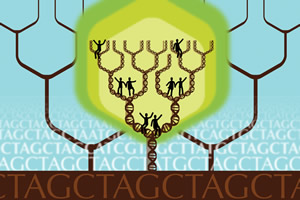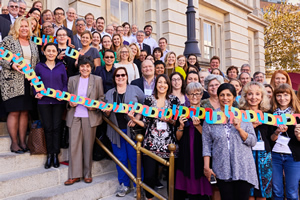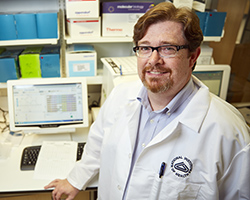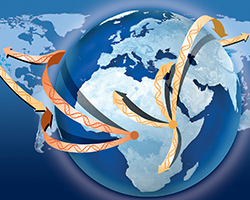


The final version of the Common Rule, also known as the Federal Policy for the Protection of Human Subjects, strengthens protections for people who volunteer to participate in research. At the same time, it ensures that the oversight system does not add inappropriate administrative burdens, particularly to low-risk research. The final rule was published January 19, 2017. Federally funded research must comply with the changes beginning on January 19, 2018.
Posted: January 24, 2017
This month, the National Human Genome Research Institute (NHGRI) celebrates 20 years as an NIH institute! The milestone highlights the transition from the center known as the National Center for Human Genome Research, to our current status as a full-fledged NIH institute. Those 20 years encompassed a host of research accomplishments, from the completion of The Human Genome Project, to DNA sequencing technology development, to bringing genomic medicine to the clinic. Happy Birthday, NHGRI! Here's to another 20 great years!
Posted: January 10, 2017
In this month's The Genomics Landscape, we reflect on the career of Jeffery Schloss, Ph.D., who led the DNA sequencing technology development and the $1,000 Genome programs. We also feature the new dbGap Data Browser; the "Your DNA, Your Say" survey from the Global Alliance for Genomics and Health; Dr. Diana Bianchi's new NHGRI laboratory; and the applications for the 2017 ASHG/NHGRI policy and education fellowships.
Posted: January 10, 2017
In a perspective published in the journal Trends in Microbiology, NHGRI researchers and their colleagues call for health disparities research that focuses on the microbiome. Health disparities and the microbiome are influenced by people's environments and social interactions. According to the researchers, the microbiome and health differences experienced by diverse people may be a two-way street, with biological and environmental factors influencing each other.
Posted: January 10, 2017
For several years, NHGRI and the American Society of Human Genetics (ASHG) have provided a pathway for scientists who want to pursue careers in science policy or education. The Genetics and Public Policy Fellowship and the Genetics and Education Fellowship offer effective experiences in the public, private and non-profit arenas to those with graduate education in genetics. These fellowships help build the skills required to inform science policy and education. Our 2016-2017 fellows share what they've accomplished.
Posted: January 07, 2017
Your family health history can identify whether you are at a higher risk for some diseases. But people don't necessarily know their entire family's health history. A new study shows that asking multiple family members for family health histories can improve the accuracy of both the family's health history and personalized risk assessments. NHGRI intramural researchers published the study in the American Journal of Preventive Medicine on January 4, 2016.
Posted: January 04, 2017
Geared to students grade 9-12 worldwide, the American Society of Human Genetics (ASHG) DNA Day Essay Contest celebrates National DNA Day by asking students to examine, question and reflect on important concepts in genetics. This year's question asks students to describe a disease or condition researchers are attempting to treat and how gene therapy might repair the underlying cause of the disease or condition. Deadline: March 10, 2017, at 5 p.m. U.S. Eastern Time. See: DNA Day Essay Contest
Posted: January 04, 2017
Family gatherings around the holidays are the perfect time to learn about your family's health history. A few thoughtful questions can reveal a pathway to preventing future disease and improving your health. Vice Admiral Vivek H. Murthy, M.D., M.B.A., the U.S. Surgeon General, has upheld this proud tradition, and encourages Americans to talk about their family health histories and to eventually record their inherited health conditions.
Posted: December 19, 2016
This month's The Genomics Landscape features stories about the expansion of the Human Heredity and Health in Africa (H3Africa) program, mouse knockouts and the "druggable" genome, the full ancestry data the Genome-Wide Association Study Catalog is releasing and all the latest news, funding opportunities and genomics research from NHGRI. There's also a reminder about the My Family Health Portrait tool, a place to share health information and learn about familial health conditions.
Posted: December 06, 2016
Through a simple blood test, physicians will soon be able to map the fetus' entire collection of genes (the whole genome) using fetal DNA that floats in the mother's blood. But a survey of 1,000 physicians says that ethical guidelines must be developed first. Researchers with the National Human Genome Research Institute published their findings in the December 6th issue of the journal Prenatal Diagnosis.
Posted: December 06, 2016
The Undiagnosed Diseases Network, an NIH Common Fund program aimed at solving challenging medical mysteries, isn't going anywhere anytime soon. The program has just approved funding through 2022. With this investment, the UDN will continue to accept participants with undiagnosed conditions and hopes to better understand how to become self-sustaining in the future. Funding announcements are planned for Summer 2017, pending available funds.
Posted: November 29, 2016
About half of a man's risk for developing prostate cancer arises from malfunctioning genetic variants that are inherited. Finding those variants is challenging, in part because each variant makes a modest contribution to disease risk. By examining the whole exomes - the 1-2 percent of the genome containing protein-coding genes - of 75 high-risk families, NHGRI researchers identified three new variants that increase a man's risk for developing prostate cancer. The findings were published Nov. 26 in Oncotarget.
Posted: November 28, 2016
NHGRI researchers have identified connections in the brain that are linked to Attention Deficit Hyperactivity Disorder (ADHD). Researchers studied large, multi-generational families to detect which brain connections are heritable in ADHD, those passed down from parent to child. These heritable brain features can help researchers discover and understand the genes associated with ADHD. The study was published November 16 in JAMA Psychiatry.
Posted: November 22, 2016
As you celebrate Thanksgiving with your family, remember that this special day is also National Family Health History Day, a day that can be important to the health of you and your family. Collecting your family health history can help you detect unique disease risks, manage them before becoming sick, and help with treatment and diagnosis if you do become sick.
Posted: November 21, 2016
Using genetic information in the clinic is expanding, requiring a dialogue between researchers, clinicians and regulatory bodies. ClinGen - co-funded by NHGRI, the National Cancer Institute, and the Eunice Kennedy Shriver National Institute of Child Health and Human Development - helps define the clinical relevance of genetic variants. Their new report describes how a dialogue between the FDA and ClinGen works in providing accurate genetic test results.
Posted: November 21, 2016On June 5-7, 2017, the conference Genomics and Society: Expanding the ELSI Universe will gather ethical, legal and social implications researchers to reflect on current research and discuss future directions. With keynote speakers, plenary panels, workshops, and a wide range of paper, panel, and poster presentations, the Congress will provide an opportunity for scholars to reflect on current research and envision future directions for ELSI research. For more information and to register: elsicon2017.org.
Posted: November 18, 2016
On November 15, Sarah Tishkoff, Ph.D., gave the first lecture in the 2016-2017 Genomics and Health Disparities Lecture Series. Dr. Tishkoff studies genomic and phenotypic variation in ethnically diverse Africans, combining field work, laboratory research and computational methods to examine African population history. Video will be available soon.
Posted: November 10, 2016
Three students share their stories about being a part of the National Institutes of Health (NIH) Summer Internship Program in Biomedical Sciences. The program, one of four NIH internship subprograms, was launched in 2015 to increase the participation of students from underrepresented backgrounds in science. Non-traditional college students and students from diverse backgrounds are given the opportunity to perform cutting edge research in a federal lab. Posted: November 08, 2016

The pace of genomic advances does not seem to be slowing down, as evidenced by what I saw reported recently at last month's American Society of Human Genetics meeting in Vancouver. In this month's issue of The Genomics Landscape, I've highlighted some of these advances, including a recent gathering to help developing nations establish capabilities in genetics and genomics and bring the benefit of genomic medicine to their countries.
Posted: November 01, 2016
National Institutes of Health (NIH), researchers have identified a novel role for a gene known as heat shock protein 60 (Hsp60), finding that it is critical in tissue regeneration and wound healing. Researchers found that topical treatment of an Hsp60-containing gel dramatically accelerates wound closure in a diabetic mouse model. The study was published online today, October 27, in the journal npj Regenerative Medicine.
Posted: October 27, 2016
For the first time, NIH researchers have demonstrated in mice that gene therapy may be the best method for correcting the single faulty gene that causes Niemann-Pick disease, type C1 (NPC1), a rare and fatal disorder of the central nervous system. The study, led by researchers at the National Human Genome Research Institute and the Eunice Kennedy Shriver National Institute of Child Health and Human Development, was published Oct. 26 in Human Molecular Genetics.
Posted: October 26, 2016
Genome sequencing is now used to diagnose patients, but developing standard practices for identifying genetic variants, interpreting their role and reporting results is a challenge. A study in Genetics in Medicine surveyed sequencing center practices and found some practices are shared, possibly indicating developing standard practices, while other practices might warrant more guidelines. The Clinical Sequencing Exploratory Research program, co-funded by NHGRI and the National Cancer Institute, conducted the study.
Posted: October 18, 2016
Leslie G. Biesecker, M.D., chief of NHGRI's Medical Genomics and Metabolic Genetics Branch, has been elected to the National Academy of Medicine (NAM). Dr. Biesecker is a clinical and molecular geneticist who studies the cause of rare disorders, such as Proteus syndrome, to improve medical treatment for affected individuals. NAM recognizes individuals who have made major contributions to the advancement of medical science, health care and public health.
Posted: October 13, 2016
In this issue of The Genomics Landscape, we feature an overview of NHGRI's impressive technology development programs and the many accomplishments and goals those programs have achieved. There's also a story on an NHGRI training program that "turns docs into researchers," a review of a recent workshop that focused on family health history tools and a welcome to two new policy and education fellows.
Posted: October 04, 2016
NHGRI is pushing beyond current capabilities in genome sequencing. New funding awards, totaling approximately $6.7 million, are part of a technology investment that began in 2004. The aim is to advance the development of genome sequencing technologies that are faster, cheaper, and more accurate and sensitive than those we already have.
Posted: October 04, 2016
The U.S. Food and Drug Administration (FDA) has announced two draft guidances to support President Obama's Precision Medicine Initiative. The guidances will help provide oversight for tests based on next generation sequencing, a technology that examines a person's DNA to detect medically important differences in genomic make-up that could increase disease risk. The 90-day comment period ends October 6, 2016 at 11:59 p.m. Eastern
Posted: October 04, 2016
The Physician-Scientist Development Program (PSDP) at the National Human Genome Research Institute helps physicians develop research programs dedicated to the disorders they specialize in. The program trains fellows to use the tools that unlock information in the human genome for real world applications, such as finding cures for genetic diseases. Armed with training from the PSDP, Dr. Peter McGuire joins the Division of Intramural Research as its newest faculty member.
Posted: October 03, 2016
In July, the U.S. Food and Drug Administration (FDA) announced two draft guidances regarding principles that oversee the use of next-generation DNA sequencing (NGS) technologies, specifically providing guidelines for NGS-based clinical tests. The FDA will hold a public workshop this Friday, September 23rd on NIH's main campus to frame the workshop goals, provide moderated panel discussions and give the public an opportunity to comment.
Posted: September 21, 2016
Researchers have begun identifying genetic mutations that evolved over thousands of years to protect Africans from disease pathogens. NHGRI Researcher Charles Rotimi, Ph.D., calls for comprehensive DNA sampling and genetic characterization of Africans and the people of the African Diaspora in an opinion article in the journal Current Opinion in Genetics & Development.
Posted: September 16, 2016
In an effort to make information about clinical trials widely available to the public, the U.S. Department of Health and Human Services (HHS) has issued a final rule specifying the requirements for registering and reporting summary results information to ClinicalTrials.gov. The new rule expands the legal requirements for submitting results. NIH also has issued a complementary policy for submitting summary results information for all NIH-funded clinical trials.
Posted: September 16, 2016